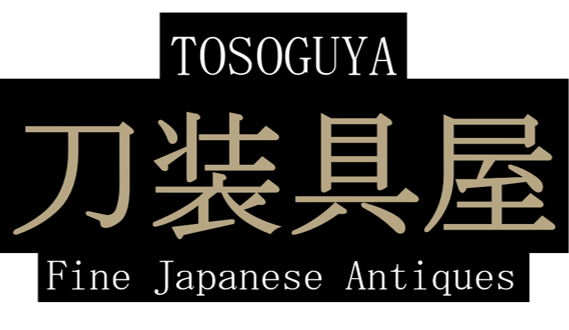

Shōnai school (庄内) iron tsuba, signed with kao (花押), attributed to Yoshitoki (宜時). The motif is a classic cloud dragon motif. The motif is often described as waves and cloud dragon, or Hatō unryu (波濤雲龍図), implying ocean and sky, but this is an incorrect interpretation. There is a type of cloud which mimics the classic stylized cresting wave in Japanese art (see below). The dragon's domain is a turbulent, billowing, cloudy sky. The motif is well executed with a carving technique termed Katakiri Kebori (片切毛彫). The shape of this tsuba is round, or maru-gata (丸形). The rim is squared, with tiny bit of roundness, Kaku-mimi ko-niku (角耳小肉). The plate is perforated with two small holes called udenuki-ana (腕貫孔), though the NBTHK Hozon papers only describe them as ko-sukashi (小透).
The tsuba is signed with a Kao (花押) on the reverse side, but no signature. Fortunately the kao has been tracked down, and it is believed to be that of a Shōnai school artist named Yoshitoki (宜時), see reference image below.
Translation of the Hozon paper description follows:
波濤雲龍図鐔 (Hatō unryū zu tsuba)
銘
(花押)
(Mei [Kao])
丸形 鉄地 片切毛彫 小透 角耳小肉 (Maru-gata
tetsu-ji katakiri-kebori ko-sukashi kaku-mimi ko-niku)
Heisei 28th year (2016) November 8th
Measurements: 8.15cm x 8.21cm x 0.45cm
Mid Edo Period (江戸時代中期), ca. 1725-1775
SOLD



References: Left: Wakayama, Toso Kodogu Meiji Taikei, vol.III, pg 45. Right: Joly, Shoshankenshu, 1st ed. 1919.
